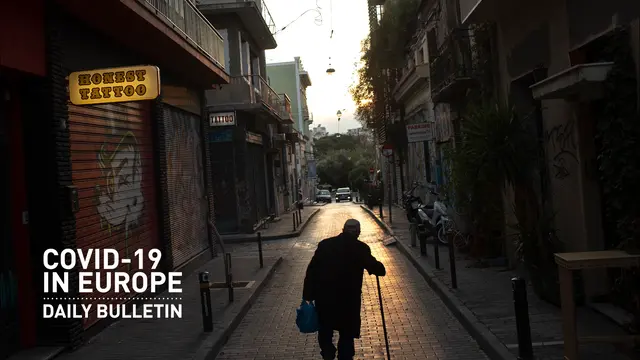TOP HEADLINES
• Greece and Spain have become the latest European countries to limit the roll-out of the AstraZeneca vaccine citing a lack of data. Greece has said only those under the age of 65 will be able to get the vaccine, while Spain has only approved the dose for use in 18-55 year olds.
• Germany is undecided whether to extend its nationwide lockdown , with Chancellor Angela Merkel and regional leaders set to make a decision during a meeting next Wednesday,a state source has said.
• Slovakian authorities have quarantined a Roma settlement in the eastern region of Sacurovafter a quarter of its residents tested positive for the virus.
• Greece has tightened its lockdown restrictions in three regions , including the capital Athens, amid rising in infections. The new measures, which include a stricter night-time curfew and the closure of all non-essential shops on weekends, will last for 10 days in Attica,ThessalonikiandHalkidiki.
• The UK government is examining ways it can document those who have been vaccinated against the virus , after Denmark and Sweden announced plans to launch "corona passports," the country's foreign office ministerJames Cleverly said.
• Belgium has allowed hairdressers to reopen this weekend after new infections slowed while camping and cabin sites will be allowed to reopen from Monday and beauty parlors from March 1.
• The variant first discovered in the UK accounts for the majority of new infections in Slovakia , Prime Minister Igor Matovic said. Preliminary results showed that 71 percent of all positive tests discovered on Friday were the new variant.
• UK Prime Minister Boris Johnson has warned that it is "still early days" to start easing lockdown measures , despite reports suggesting pubs could reopen in May.
• Scientists are having to "second guess" future mutations of the virus as vaccine developers work to create new jabs that are effective against different variants , the chairman of the UK Vaccine Taskforce, Clive Dix said.
• The Six Nations rugby tournament , which includes international teams from Italy, France, Scotland, England, Wales and Ireland, begins on Saturday without spectators.

Greece has tightened measures for 10 days in three regions, including Athens, where infections rates are soaring. /AP
ACROSS EUROPE
Rahul Pathak in Madrid
While it looks like Spain has seen the worst of the current wave of the pandemic, it's the new variants of the virus that are causing concern amongst health authorities.
On Friday the country recorded its first ever case of the variant discovered in South America, when a 44-year-old man who had flown into Madrid from Brazil tested positive on arrival.
The mutation that has the biggest impact remains the variant first discovered in the UK, which is thought to be behind a significant portion of all infections.
Also on Friday, Spain reported a total of 28,565 new infections, which continues the recent downward trend from a peak of above 40,000 a week ago
READ MORE
Denmark's $33bn renewable energy island
The toolkit defeating the pangolin poachers
Will soldiers become obsolete?
Andrew Wilson in the UK
The majority of adults in the UK may have received a coronavirus jab by the end of May, according to a senior government advisor, with most over-50s inoculated by the end of April.
UK prime minister Boris Johnson and France's President Emmanuel Macron have discussed working together over a global vaccination program. This comes after a week of tension between the UK and EU over the vaccine rollout and supply problems.
Roughly one in 20 people infected by coronavirus are thought to develop parosmia, a condition where tastes and smells become distorted, sometimes making pleasant smells repellent.
New data suggests the Oxford University-AstraZeneca vaccine works well against the fast-spreading variant discovered in the UK but is less effective against a strain first identified in South Africa.
Greece
Greece has tightened some of its lockdown restrictions in high-risk areas of the country as it seeks to slow the spread of the virus.
The measures, which include a tightened night-time curfew and the closure of all non-essential shops on weekends will last for 10 days, in three regions – not just Attica (the peninsula that includes Athens),but also Greece's second city Thessaloniki andits neighboring peninsula Halkidiki.
The curfew will be brought forward from 9 p.m. to 6 p.m and will include the capital city Athens.
Meanwhile, Greece has limited the use of the Oxford-AstraZeneca jab to those under the age of 65 amid "insufficient evidence" on the efficacy of the vaccine in elderly people, health ministry general secretary Marios Themistokleous said.

Germany's Chancellor Angela Merkel is expected to meet with regional leaders next Wednesday to discuss whether to extend the country's lockdown restrictions. /AP
FROM OUR GLOBAL COLLEAGUES
**CGTN Europe: **
The Answers Project – Will soldiers become obsolete?
CGTN China:
China's vaccines in the last stage of assessment: WHO
**CGTN America: **
U.S. virus deaths surpass 450,000 before Super Bowl Sunday
CGTN Africa:
Uganda indefinitely suspends pre-primary school amid virus spike
Sign up
here
to get the COVID-19 Europe bulletin sent directly to your inbox.
CGTN Europe has been providing in-depth coverage of the novel coronavirus story as it has unfolded.
Here
you can read the essential information about the crisis.
 简体中文
简体中文

